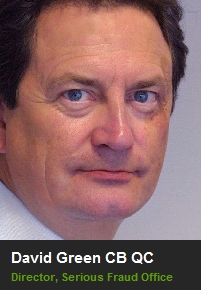Bribery Act & Proceeds of Crime - Written by Barry & Richard on Sunday, July 6, 2014 2:44 - 0 Comments
OPINION: Light at the end of the tunnel & a review of the last 12 months from David Green QC
 Introducing the Annual Report for the SFO in the last financial year David Green, CB QC, Director of the Serious Fraud Office had this to say:
Introducing the Annual Report for the SFO in the last financial year David Green, CB QC, Director of the Serious Fraud Office had this to say:
“Since I took up post in April 2012, we have sharpened the strategic focus of the SFO on the casework for which the Roskill model was designed and intended. This is the topmost tier of serious and complex fraud and bribery.
Consequently:
(i) We are undertaking fewer but much larger and more complex investigations. Examples include LIBOR, Rolls-Royce, Barclays/Qatar, ENRC, Alstom, G4S Serco.
(ii) We have expanded our analytical and intelligence capability, and currently have significant pre-investigation projects in development.
(iii) At the other end of the pipeline, we had 11 cases involving
34 defendants charged and awaiting trial as at 31 March 2014.
In the reporting year 2013-14 we have had 8 prosecutions of 18 defendants either concluded or in progress. The conviction rate by defendant was 85%. All of our cases are high profile and therefore high risk.
With our recalibrated caseload, expanded intelligence capability, the building of cooperation with partners and stakeholders foreign and domestic, blockbuster funding for exceptionally large cases and the recruitment and retention of high quality staff, I am confident that we have in place the building blocks necessary for the success of the SFO.”
This is all true.
A read of the SFO’s Annual Report reveals some more interesting facts and figures.
| Cases in progress during the year | |
| New investigations opened | 12 |
| Investigations concluded without charge | 3 |
| Defendants charged | 35 |
| Number of prosecutions concluded or in progress (by defendant) | 18 |
| Number of prosecutions concluded or in progress (by case) | 8 |
| Trials | |
| Trials in progress during the year (by defendant) | 14 |
| Trials in progress during the year (by case) | 5 |
| Trials concluded by defendant | 9 |
| Trials concluded by case | 3 |
| Trials reaching jury consideration by case | 2 |
| Defendants awaiting trial start at year end | 34 |
| Convictions | |
| Total defendants convicted | 11 |
| Defendants convicted by plea | 4 |
| Defendants convicted by jury | 7 |
| Conviction rate percentage | 85 |
The Annual Report also neatly summarises the purpose of the SFO which bears repeating here so the numbers (and the activities of the SFO in general) can be been in context.
“The SFO was established in 1988 and given its powers under the Criminal Justice Act (1987) following the 1986 ‘Roskill Report’ (the report of the Fraud Trials Committee). The report recommended that, as these kinds of cases are very complex, multi-disciplinary teams of lawyers and investigators are needed to work together from the beginning to secure more effective outcomes.
We take on a small number of large cases and these will include cases
- Which undermine UK commercial/financial in general and the City of London in particular.
- Where the actual or potential sums involved are high.
- Where actual or potential harm is significant.
- Where there is a very significant public interest element.
- That represent new species of fraud.
We also assist overseas jurisdictions with their investigations into serious or complex fraud, bribery and corruption.”
Opinion
The SFO has had more than its fair share of poor press in the last couple of years and criticism has been heaped upon it.
And yet.
Our sense is that the shift in emphasis on big investigations, the focus on top tier fraud allegations and the management changes in the last couple of years have had a significant effect. There are more serious large scale and complex prosecutions on the books of the SFO today than for many years.
Of course, there is still plenty to do and the SFO must deliver results.
On top of that and irrespective of what anyone says – the SFO remains underfunded.
Plans to review the way in which international corruption is investigated in the UK are to be welcomed. They should include a properly funded SFO.
In the meantime, while the SFO is not yet through all its problems, there does appear to be light at the end of the tunnel.


